- Home
- Amie Kaufman
Their Fractured Light Page 14
Their Fractured Light Read online
Page 14
“After you.” He offers up a bow that even the fanciest of the fancy at that party on the Daedalus would approve of—a bow that belongs to the guy who knew which art to admire on Kristina’s walls. I tuck that thought away for later.
“You’re not planning on murdering me, are you?” I murmur, shuffling into the space beyond the door. It feels large, my voice echoing slightly; the palm pad’s light is too dim to disperse the darkness more than a meter or so in front of me.
Gideon doesn’t reply—I hear only his footsteps, moving away and fading into the quiet. Just before I can start to panic at having been abandoned, a light flickers on in the darkness. Some distance off, a neon sign comes to life—LIVE MUSIC, it says in bright, green and blue letters. Then another light comes on, and another, and another, until they become a cascade of glowing storefronts and streetlamps.
It’s an entire arcade of abandoned shops and restaurants. The floor is polished stone tile, and the fine layer of dust coating everything turns its reflections of the neon lights foggy—like row-house lights reflected in a river.
I spin around to find Gideon beside the entrance, shutting the door of an old-fashioned fuse box. My surprise must be obvious on my face, because when he turns to look at me, his own expression splits into a smug grin. “Nice enough to crash here for a few days?” he teases.
“What is this place?” I breathe.
“It used to be a mall of some sort,” Gideon replies, moving away from the entrance to join me. “It had to have been shut down at least thirty years ago—no hypernet boards, you’ll notice, all retro neon and digital signs. My guess is that they emptied it with the intention of leveling the place and building housing instead, but the developer changed direction, or the company dropped the project, I don’t know. As far as I can tell, it’s been completely forgotten.”
I hunt for a reply, too stunned by the strangeness of it—an entire part of the city lost in time—to speak coherently. I want to tell him it’s beautiful, because it is, and that it’s sad, too—lonely in the brightness of its signs, calling for customers who will never come, shining light on the marble floor where the only footprints in the dust are ours.
Gideon moves away, letting his pack slide to the ground, and the bag with our supplies as well. He uses one of the blankets to wipe away some of the dust, then piles the other ones on top to make a place to sit. I drift over to join him, still fascinated by the arcade, but too tired not to sink to the floor at his side. In the past two days, the only sleep I’ve gotten was the few hours I spent passed out in Gideon’s den. And he’s had even less.
“I pulled up some schematics from the Daedalus,” he says, retrieving a palm pad from his pack and waking it up. “Engineering, where the rift’s most likely to be, is a few decks down from where the gala’s being held. Security will be tight to keep people from leaving the public areas, but that’s where I come in.”
“You’re going to hack LaRoux Industries security that easily?” I raise an eyebrow at him, but he’s focused on his screen.
“I’ve done it before,” he says absently, as though that’s no great feat. “But that gala’s going to be swarming with people, and I don’t have a few weeks to try to get hired as an IT guy.”
“We’re going to go as guests.” When he lifts his head in surprise, I flash him a smile. “Don’t panic. It’s not that hard to fit in with that crowd. We’ll make nice for a while, drink the champagne and dance and carry on, but at some point LaRoux, and no doubt his daughter, too, will come out and make a bunch of speeches.”
Gideon’s mouth twitches, brows furrowing slightly. “What if LaRoux knows our faces from the security feeds? They’ll recognize us.”
“We’ll slip out as he takes the stage. The museum itself will be locked down—we’ll have plenty of time to make it to Engineering before they open the exhibits to the public.”
Unless I can get a good shot at LaRoux himself before we slip out of the ballroom. I clear my throat. “Let me just run through the etiquette of this sort of event, so you don’t end up accidentally offending half the planetary delegations.”
As we start going over what’ll happen at the party, I can’t help but think of Daniela, the woman who taught me most of what I needed to know in those first few weeks after I left Avon. In her early thirties, she could no longer play the innocent teen—having a younger accomplice got her places she couldn’t go alone. Three months we were together. And when the time came, Dani betrayed me as easily as she’d taken me under her wing, leaving me for the authorities to find when one of our marks clued in that we were after his money.
My mind refuses to form the words of the question roiling in my heart. I won’t ask myself whether betraying Gideon would be that easy for me, especially now that he’s lost Mae. It’ll just have to be. I want to stop LaRoux as much as he does, but if it comes down to a choice between exposing the rift to take down the company and destroying LaRoux, the man, himself…Gideon’s made it clear he would choose the former. And that means I have to be willing to walk away from him.
We work on our cover story. We’ll be Jack Rosso and Bianca Reine, a couple fresh out of school from the alpha city on Paradisa, attending the opening-night gala as part of a whirlwind tour of the galaxy before heading to university. I follow up on my contact’s lead on a designer looking to offload one of last season’s runway dresses for cheap, and call in Gideon’s measurements to a tailor in midtown. He seems to have unlimited funds for this—I’m not without my own resources, but he’s clearly done well enough for himself that he could’ve chosen a nicer home than the one he just blew up.
As I organize our outfits, Gideon works more magic with his databases and manages to cobble together fake ident chips for us both, complete with holographic projections of our faces in case anyone removes them from our palm pads.
I don’t ask when he scanned me with a 3-D imager. I don’t want to know.
Gideon discovers a picture Mae posted of herself and the twins, time-stamped that day—her way of letting us know she has them back. Some of the weighty tension he carries leaves him at the sight of them together, but I know the loss of this last safe harbor has left him crushed.
The days pass in fits and starts, in flurries of activity and long, agonizing stretches where all we can do is wait. We could use this time to talk about ourselves, to draw closer together, bound as we are by the mission we’ve chosen. But neither of us makes that move. We keep our silence, and our secrets, and hiding in this place that’s suspended in time, it seems as though we’re suspended too.
I try to find some way to leave, if only for a few hours, but Gideon’s stuck to me like glue—which he has every reason to be. Somehow I have to get back to my apartment, just for a moment, to retrieve the plas-pistol from Kristina’s bedroom. Getting such a highly illegal weapon took me months of work, and there’s no way I’ll get another before we execute our plan to board the Daedalus. And I don’t want Gideon to know why I want to sneak a gun in with us.
Two days before the gala, I finally give up. “I’ll need to duck out of here for a while at some point,” I say, keeping my eyes on the screen of the latest burner palm pad he’s given me. I can tell he’s looking at me—his breath has an audible catch to it when he’s watching me—but I don’t look up. I keep my voice casual. “Just need to pick up our clothes and a few other things.”
“Sure,” Gideon replies easily. “I’ll come with. Help you spot trouble before it spots you.”
I clear my throat, glancing up finally from the ground and locating a smile. “Not to wound your macho sense of chivalry, but I can handle it myself.”
“Like you handled it at your apartment?” His grin flickers, and I can tell he regrets the words as soon as they’re out.
I wish I could act nonchalant, like it doesn’t faze me. But instantly I’m back in my penthouse again, hiding in the kitchen from men twice my size. I swallow and settle for dropping my eyes so Gideon can’t see me afraid. “I can disa
ppear easier on my own.”
When he doesn’t answer me, I look up. He’s still watching me, and utterly unashamed to be caught staring. He doesn’t look away but rather tilts his head slightly to the side, as though trying to see me better from some other angle. I’m struck all over again by the quick intelligence there, so easy to overlook when he’s playing the arrogant, smug asshole he projects to the world. Suddenly I’m not so sure I’m fooling him at all with my excuses for wanting to be alone. And worse—suddenly I’m absolutely certain I don’t want to.
“I have to go back to my apartment,” I whisper, before I can stop myself.
Gideon’s eyes close a fraction too long, and I can tell I was right. He knew I was hiding something. Let him think this is it. “Sofia, you can’t.”
“That’s why I didn’t tell you,” I reply, voice sharp. “I know it’s dangerous. But I’ll be in and out in no more than a minute. No time for anyone to show, even if they have surveillance.”
Gideon grimaces, scowling at the floor. “What’s so important that it’s worth risking your life for?”
My gun. The words rattle around in my mind. My only way out of this hell. My only shot, literally, the only weapon I can get through LaRoux’s security. My throat starts to close, and to my horror, I can feel my eyes starting to burn. I try to shove it down, try to channel it into something else—resentment or fervor or confidence, anything—but I can’t. He keeps looking at me, and right now, in this moment, I’m realizing I can’t lie.
“My father,” I croak finally, blinking and sending half a tear spilling out to cling to my cheek. “The only picture I have of him is in that apartment. If I lose it—” My hands clench around the blanket I’m sitting on, a useless attempt to grab for control. “If I can’t get it back, then I lose him entirely. Forever.”
It’s the truth. I do want that drawing, tucked safely behind one of the fake photos on the sideboard, almost as much as I want the gun in my bedroom. Almost—but not quite.
Gideon’s face, what I can see of it through the blur of tears, softens. “I get it, I do. You know that I do.” His eyes go to his pack, and I can see, for the tiniest moment, my grief reflected there in his face. Abruptly I’m reminded of that book he brought with him, the only thing he grabbed from his den that wasn’t computer equipment. “But Sof, it’s just a thing.”
I shake my head, the movement sending another tear to join the first. Even now my memory of the picture—a drawing Mihall made for me, since we didn’t have a camera—is blurring. I try to picture my father’s face, imagine his voice, and the fragments of memory flutter past, fleeting, impossible to reassemble. The particular pattern of calluses on his palm, the half-tuneless ditty he’d whistle to himself while he worked, the shuffle of his boots on the doormat when he came home—each time I grab for one memory the others fly away.
But with that piece of paper in my hands the fragments settle, drawn to the lines of ink and graphite like moths to the paper lanterns lighting the undercity at night.
“It’s not just a thing,” I whisper.
Gideon hesitates a long moment, then sighs. “No. It’s not. Just…be careful, okay?” He lifts a hand, the movement slow enough that I can pull away. I don’t. The edge of his finger brushes my jaw, and the tear clinging there comes away at his touch.
I blink to clear my vision and find his eyes—hazel, with a ring of green—on mine.
He clears his throat and lurches back, regaining his balance as he stands up. “After all, if you get snatched and I have to go to the Daedalus on my own, some socialite is probably going to ask me to dance, and then I’ll be done for.”
Surprise is enough to give me a handhold to pull myself out of my grief. “You don’t know how to dance?”
Gideon raises an eyebrow. “Do I look like I know how to dance?”
I discover a smile trying to fight its way free, despite the tearstains I can still feel chilling my face. “I can teach you.”
Gideon pauses, thoughtful, his eyes on my mouth. I think he sees the smile too, because his grin flashes abruptly. “If there’s going to be dancing at the gala on the Daedalus, then it’d be criminally negligent to head up there without knowing a few steps, wouldn’t it?”
“Well…” I say slowly. “Not really. If asked you can always just say you don’t feel—”
“I said,” Gideon interrupts, stressing each word individually, “that it’d be criminal not to practice dancing, wouldn’t it?” His eyes gleam, and he grabs for his lapscreen to turn up the volume and open a hypernet radio app.
“Find a classical music station,” I say finally, clearing my throat and getting to my feet. “A waltz if you can, those are easy to learn.”
It’s only after I speak that I realize he might not even know what a waltz is—I didn’t, before Dani—but he doesn’t even hesitate. Not for the first time, I wonder if this might not be his first exposure to the upper classes. I know so little about him, about his past and what brought him here, that I might as well be gazing at a complete stranger. After testing a few different spots to find satellite reception, and flipping through a few stations, he finds a brisk, cheerful waltz. I don’t recognize it—I don’t know classical music, or in fact any music, well at all, unless it’s the lively fiddles and bodhrans of Avon.
“Okay, so how does this work?” Gideon straightens, glancing at me and then quickly back at the palm pad, like the source of the music echoing grandly through the arcade might help him more than I will.
He’s nervous. I’d want to laugh, except that my own heart rate hasn’t settled properly in days. Get a grip, Sofia.
“Come here,” I say, trying to sound brisk, businesslike. I can’t fool myself anymore that that’s all this is, but I also can’t let myself give in. My thoughts want to open up, to look beyond the Daedalus, but I know there is no “beyond the Daedalus.” And if I let myself think there could be, I won’t be able to do what I’ve been working toward for the past year of my life. He’s been working to uncover LaRoux’s plans, but I’ve been working just to get close enough to him to make him answer for murdering my father. I can’t let Gideon become more important than killing the monster that is Roderick LaRoux.
Gideon’s watching me, waiting for me to instruct him. Looking at him, I can’t help but think that maybe there could be a life after the Daedalus. I’ve wanted nothing but LaRoux’s death for so long that I’ve forgotten how to want anything else, but here, with Gideon’s face not far from mine, that cold certainty is feeling less solid with every passing second.
“Sof?”
I shove those thoughts aside and make myself sound calm. “Take my hand, like this. My other hand goes at your shoulder, just so, and yours goes at my waist.” I pause. “My waist, Gideon.”
His eyes flick up, revealing a wicked gleam there before he shifts his hand upward. “Must’ve misheard you there.”
“Mm-hmm.” I keep my voice deadpan. “Now, listen to the beat of the music. Hear that one-two-three pattern? That’s how our steps will go.…”
He’s a quick study. If I hadn’t already seen more than enough evidence of his agility while climbing through ducts and elevator shafts, this would convince me that all that exercise equipment in his den got put to good use. He’s got the basic idea down by the end of the first waltz, and the next several songs are a variety of other styles, giving me a chance to explain the differences in a few dances.
Judging by the number of songs elapsed, by the end of our first hour he’s more or less competent. The current song ends, and we pause, left slightly breathless. It was a faster song, and Gideon’s getting confident enough now to spin me around—with only limited success. He’s not a brilliant dancer, but he’s good enough. He won’t draw attention on the dance floor, either good or bad—which is exactly what we’re aiming for.
I know I should propose that we stop for the night—I know I should propose we divide up the blankets again and go to sleep in our separate corners. Turn the lights off
and leave this place once more to the dust and the dark.
But I don’t.
The next song starts to play, beginning with a haunting patter of piano notes—and I freeze.
I know this song. It’s one of the only pieces I recognize, and I know it only because of a recording my father’s friend made of a broadcast twenty years before I was born, before the transmission embargo on Avon. When I first heard it I started crying, and my father’s friend—whose name I can’t remember, why can’t I remember it?—gave the recording to me to keep.
It wasn’t until after I left Avon that I learned its name: the Butterfly Waltz in E minor. It was composed by a fourteen-year-old prodigy in a country on Earth called Iran in the twenty-third century. She was killed in a shuttle crash not long after she finished the piece. It was the only song she ever wrote. Somehow, that detail—tragic and awful as it was—made the piece more beautiful. More poignant. She may have died a child, but this song, this part of her, is still here. Echoing through the empty buildings of an arcade abandoned before I was born.
“Something wrong?”
It’s only when Gideon speaks that I realize I’m not dancing. “Sorry—no. You’re doing well, I’m impressed.” I try to put everything else out of my thoughts and follow his lead into a slow turn. Just focus on your steps.
“It’s not so hard,” he replies, voice soft as though he, too, is affected by the music. “Who taught you how to do this?”
Don’t answer. Make something up. Change the subject. My mouth opens, though, and I reply with the truth: “My father.”
Gideon’s hand against my waist shifts and draws me a little closer. “How long ago did he die?” His voice is gentle.
“Nearly a year ago.”

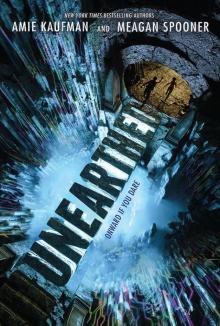 Unearthed
Unearthed Obsidio
Obsidio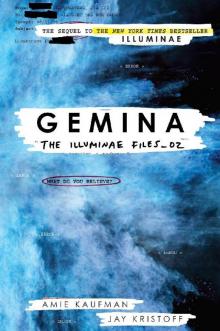 Gemina
Gemina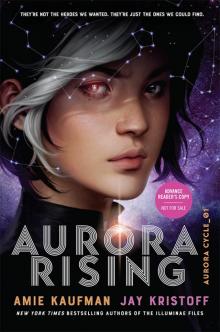 Aurora Rising (ARC)
Aurora Rising (ARC)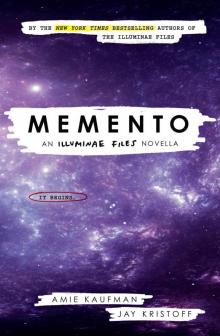 Memento
Memento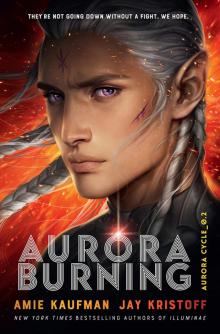 Aurora Burning: The Aurora Cycle 2
Aurora Burning: The Aurora Cycle 2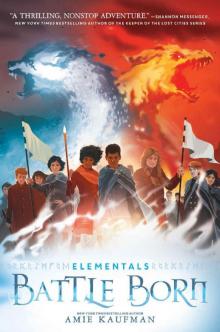 Elementals: Battle Born
Elementals: Battle Born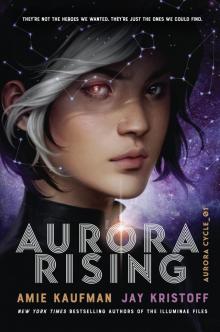 Aurora Rising
Aurora Rising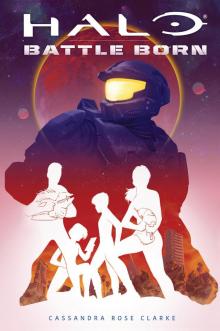 Battle Born
Battle Born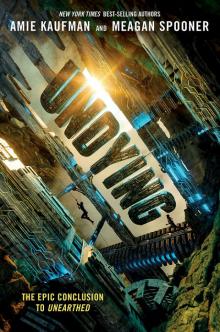 Undying
Undying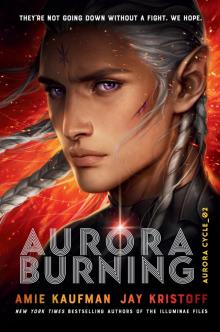 Aurora Burning
Aurora Burning Scorch Dragons
Scorch Dragons Ice Wolves
Ice Wolves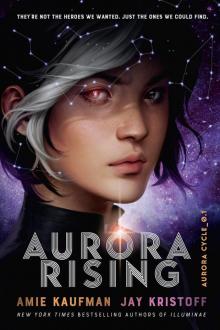 Aurora Rising: The Aurora Cycle 1
Aurora Rising: The Aurora Cycle 1 This Shattered World
This Shattered World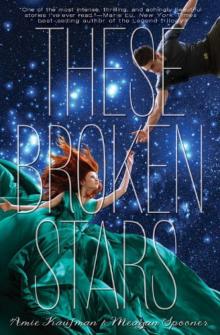 These Broken Stars
These Broken Stars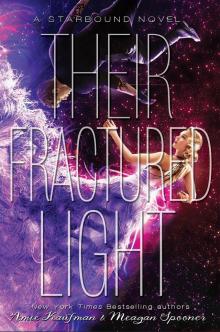 Their Fractured Light: A Starbound Novel
Their Fractured Light: A Starbound Novel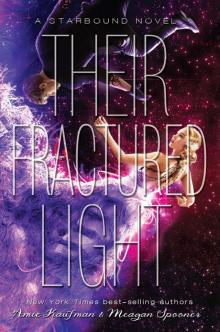 Their Fractured Light
Their Fractured Light Ice Wolves (Elementals, Book 1)
Ice Wolves (Elementals, Book 1)